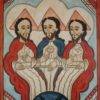Tag: Barth’s
What is History According to Barth’s Theology?: On the Covenant of Grace
Theology ultimately should be a very concrete thing, at least for the Protestant Christian. We are people of the Word of God; we are people who have been radically brought into the life of God by a deep sense of the theology of God’s Word as that has confronted us in the face of a man from Nazareth. It is this Word-grounded reality upon which we, then, as Christians think a God-world / world-God relation; that is, through the analogy of the hypostatic union, of the Theanthropos Godman, Jesus Christ. And it is as we have come to know this…
Calvin in Barth’s Services on an ‘analogy of relation’ against Natural Theology and Her ‘Resourcers’ in scholasticism Reformed
Knowledge of God is the key, that is to the ‘secret of creation.’ If “Jesus Christ is indeed the real ground of creation,”[1] then in order to know what in fact creation is for, we must first know its Creator. But as Karl Barth underscores, in a rather Athanasian key, if Jesus is the ground of creation, and if Jesus is indeed the ‘Son of the Father,’ then to know the inner-ground, the secret of creation is first to know Jesus, to know the Son. As such, prior to knowing what and who creation is for, as the case may…
What Does Barth’s Trinitarian Actualism Mean? Against the Monad
When in the realm of Barth studies, you will often hear of ‘Barth’s actualism.’ But what in fact is actualism in Barth’s theology? And might it, once understood, offer the way out of the classical modes of thought in regard to God’s relation to the world through the decretum absolutum (‘absolute decree’)? In other words, could Barth’s actualism allow us to understand God’s ways vis-à-vis the world in such a way that God is no longer understood to be a static monad, but instead, a relational and personalist God, who indeed is constituted by his perichoretic co-inhering relations as Father,…
On Barth’s and Paul’s Purported ‘Christian Universalism’ in Sachkritik
Karl Barth is often said to be a proponent of Christian universalism. The logic is that Barth’s doctrine of election, whether he likes it or not, commits him to affirming some form of a Christian universalism (i.e., the notion that all people of all time will eventually freely submit to the reality that Jesus Christ is Lord; even if that finally only happens in hell itself). But Barth adamantly rejected this supposed necessity of his theological trajectory. As Douglas Campbell writes: Barth has often been accused of universalism, but he steadfastly denied it (see the final paragraph of CD III/2),…
Barth’s Christological Novum
Here is Barth talking about event, and how, as Samuel Adams says: “If the event contextualizes us, rather than being contextualized by us, then we can say that it is something new, since its origin is “outside” of us and has the nature of an “event. . . .”: God’s revelation in its objective reality is the person of Jesus Christ. In establishing this we have not explained revelation, or made it obvious, or brought it into a series of the other objects our knowledge. On the contrary, in establishing this and looking back at it we have described and…
Does Theology Perfect Philosophy? Barth’s Nein / Przywara’s Ja
Kenneth Oakes’ book Karl Barth on Philosophy and Theology, which I reviewed a few years ago for the blog, presses the same point that Keith Johnson does in his book Karl Barth and the Analogia Entis. The point is the way Barth sees the relationship between philosophy and theology; he doesn’t, not in the way that post-mediaeval classical theism does in its effort to synthesize so-called faith-and-reason. This is one of the primary factors that has drawn me to Barth over the years. His prolegomenon is conditioned solely by what he considers to be both the formal and material principle…





